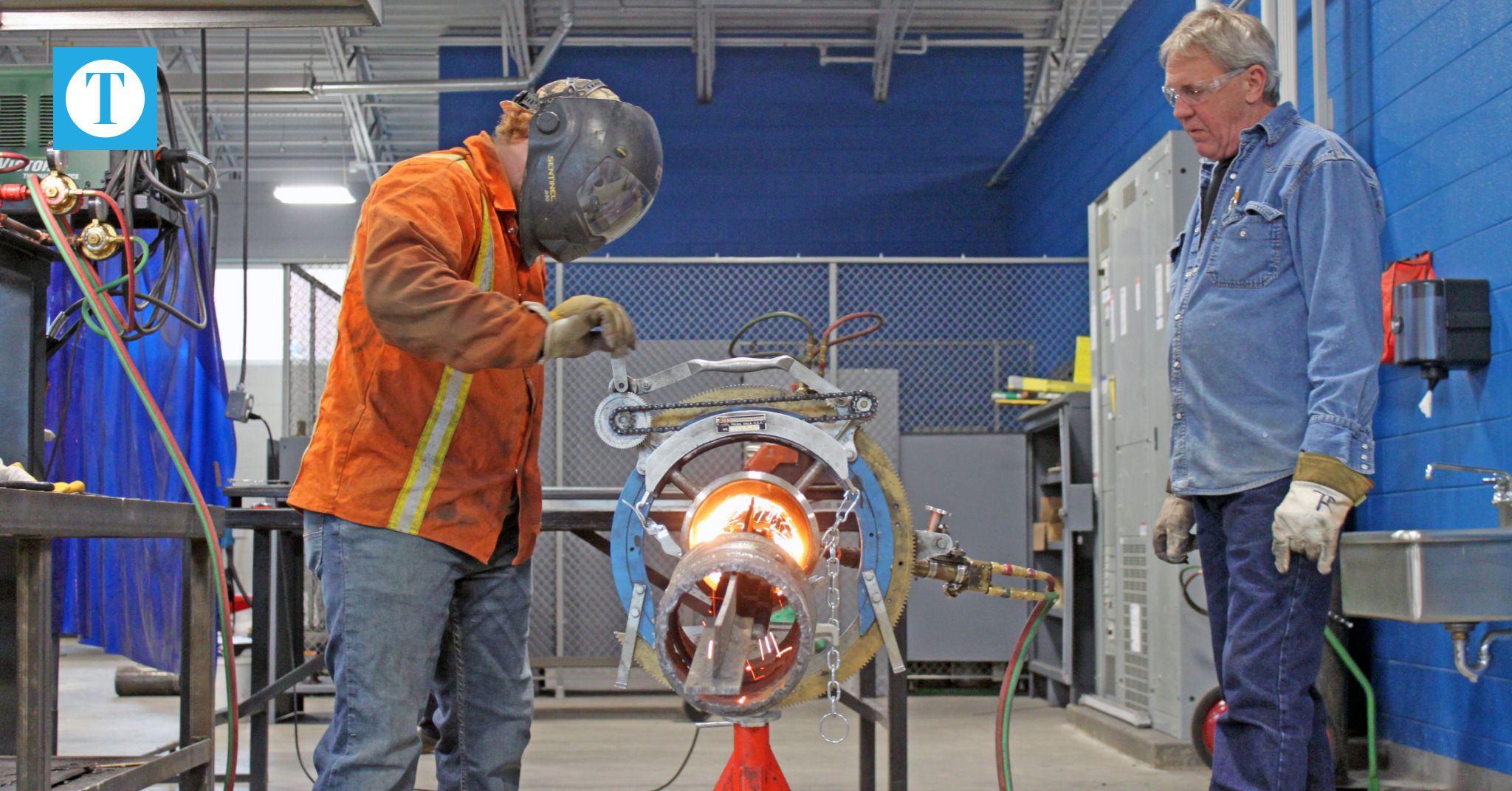Daviess County and Owensboro Public Schools know that not all students need a four-year, liberal arts degree to find success in the workplace. The leaders in both districts have collaborated to create a Community Campus, which offers high school students opportunities in industrial and other technical fields that can put them in high demand in the labor market upon graduation.
Local companies and factories are providing opportunities for technical students to pre-apprentice in order to help students become skilled workers, filling positions during worker shortages.
“Reigniting interest in technical careers is imperative due to the expected growth in these sectors and forecasted retirements,” said Stacy Edds-Ellis, Owensboro Community and Technical College’s Dean of Academic Affairs.
OPS Superintendent Nick Brake said that his mantra is that 14 is the new 12, meaning 12 years of education will not provide the necessary requirements for acquiring a job that will provide the income needed in the U.S.
“College is not for everyone, but students cannot be content with a high school diploma,” Brake said.
DCPS Superintendent Matt Robbins agrees and said he believes a district’s goal is to prepare students for success and “provide the keys to unlock the door to the future by ensuring all students are truly college and career ready.”
Both districts have staffed positions of College and Career Readiness Coordinators whose job involves working with families and students to provide information about technical careers and certificates they can receive while also earning their high school diploma. For many students, graduation from high school does not mean college.
OPS Coordinator Monica Rice said the first barrier in closing the skills gap is awareness, and that starts with the expansion of the definition of college.
“There is a cultural misconception about technical careers when in reality it is a very economically viable and rewarding career option,” Edds-Ellis said. “It is a great time in technical education if you are interested in using your talents and you enjoy hands-on learning.”

Brake said there is a huge shortage in masonry, plumbing and construction and the districts are providing options through Owensboro Community and Technical College to get training in advance of high school graduation.
“Anything we can do to position students with the new high school graduation requirements — this is different than high school campus work,” Brake said.
Rebranding of vocational courses by both districts as career and college ready and putting an emphasis on opportunities that will be available in both the college and career world have allowed students to see the demand for the trades and the ability to explore and connect to fulfilling these opportunities, Robbins said.
Amanda Jerome, College and Career Readiness Coordinator at DCPS, said that each year, more juniors and seniors participate in technical classes and programs at OCTC. Some of the popular offerings include automotive technology, diesel technology, welding, nursing assistant, industrial maintenance, electrical maintenance and information technology and they are working with OCTC and OPS to revive a carpentry pathway for students as early as fall of 2019.
According to an article published on pbs.com, the United States has 30 million jobs that pay an average of $55,000 per year and don’t require a bachelor’s degree. Combined with the fact that many of those that train in technical fields stay in their job field, according to the article, the apprenticeship opportunities that are becoming available through partnerships between the schools and local companies is on trend with meeting the needs of all interested parties.
“The biggest topic discussed locally, across the state, and nation is the workforce and the shortage of skilled workers in technical fields,” Edds-Ellis said.
Jerome said she is very focused on getting students involved in trade careers through local internships, listing Wright Implement and Regional Water Resource Agency (RWRA) as two that have partnered with the schools.
“We are always looking to expand our internships with other businesses and would love if some local tradesmen would be willing to take on some of our high school students for a semester or two to show off their craft,” Jerome said.
Another initiative DCPS took this year was taking career-bound sophomore students to visit local businesses, educating them about potential jobs in the community and the training necessary for these careers.
“Our sophomores visited Sun Windows, Unifirst, TTMA, Phill’s Custom Cabinets, Columbia and Owensboro Health, in addition to several other local employers,” Jerome said. “We want to prepare our students for life after high school and know that not all students have the same path.”
Brake said that local home builders have worked with students to get the training and opportunities needed, and that he has seen a lot of these students get hired and be successful.
According to Brake, sometimes it is a challenge to find the space, equipment and qualified instruction needed to meet the high demand. He said that OCTC has a welding lab and partners with Titan Fabricators since they are an existing industry, but that the involved parties are considering opportunities for students to take welding classes after hours. This would differ from the traditional schedule for students, who would leave their high school at noon and then attend welding classes at night.
The community has been receptive and the partnerships with OPS, DCPS, OCTC and the Greater Owensboro Chamber of Commerce have helped raise the necessary funding needed to help businesses work with the educational institutions, something that is often cost prohibitive, according to Brake.
“They [the Chamber] hear it from their membership who is clamoring for qualified tradesmen,” Brake said. “They recognize the need to engage high school students and realize that it is too late when they get out of high school to attract them.”



